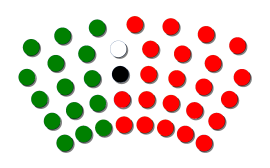
This paper applies a model in which a local market served by high-speed rail (HSR) and an airline is connected with an international market serving two different airlines. Our aim is to assess the necessity for a ban on short-haul flights from an economic policy standpoint and to investigate the potential for market self-regulation to…
- Fecha(s): 23/11/2023
- Lugar: Seminario del Departamento de Métodos Cuantitativos. Facultad de Economía y Empresa. Campus de Espinardo. Murcia.
- Ponente: Luis A. Guardiola. Universidad de Alicante.

Abstract The coordination of actions and the allocation of profit in supply chains under decentralized control play an important role in improving the profits of retailers and suppliers in the supply chain. We focus on supply chains under decentralized control in which noncompeting retailers can order from multiple suppliers to replenish their stocks. The goal…

Abstract: Convenient scheduling, characterized by adequate flight frequency, is the main quality attribute for airline services. However, the effect of airline alliances on this important dimension of service quality has received almost no attention in the literature. This paper fills this gap by providing such an analysis in a model where flight frequency affects schedule…

Abstract: Este trabajo analiza la evolución y los determinantes de la desigualdad salarial mensual y horaria en España desde 1995 a 2014 utilizando los datos de la Encuesta Cuatrienal de Estructura Salarial. El aumento de la jornada a tiempo parcial es la variable clave que explica el distinto comportamiento observado en ambas. La primera aumenta…
- Fecha(s): 05/04/2019
- Lugar: Aula Martínez Gallur
- Ponente: José Carlos González Pimienta (Universidad Carlos 3 de Madrid)

We test the turnout predictions of the canonical costly voting model through a large-scale, real effort experiment. We recruit 1,200 participants through Amazon’s Mechanical Turk and employ a 2 x 2 between subjects design encompassing small ( N = 30) and large ( N = 300) elections, as well as close and lopsided. As predicted,…

Using an ideal setting from a major food safety crisis, we estimate a full demand model for the unsafe product and its substitutes and recover consumers’ preference parameters. Counterfactual exercises quantify the relevance of different mechanisms –changes in safety perceptions, idiosyncratic tastes, nutritional characteristics, and prices–driving consumers’ response. We find that consumers’ reaction is limited…

Abstract We consider two families of strategy-proof social choice functions based on the majority principle: extended majority voting rules on the universal domain of preferences over two alternatives and generalized median voter schemes on the domain of single-peaked preferences over a finite and linearly ordered set of alternatives. We characterize their respective subclasses of obviously…








